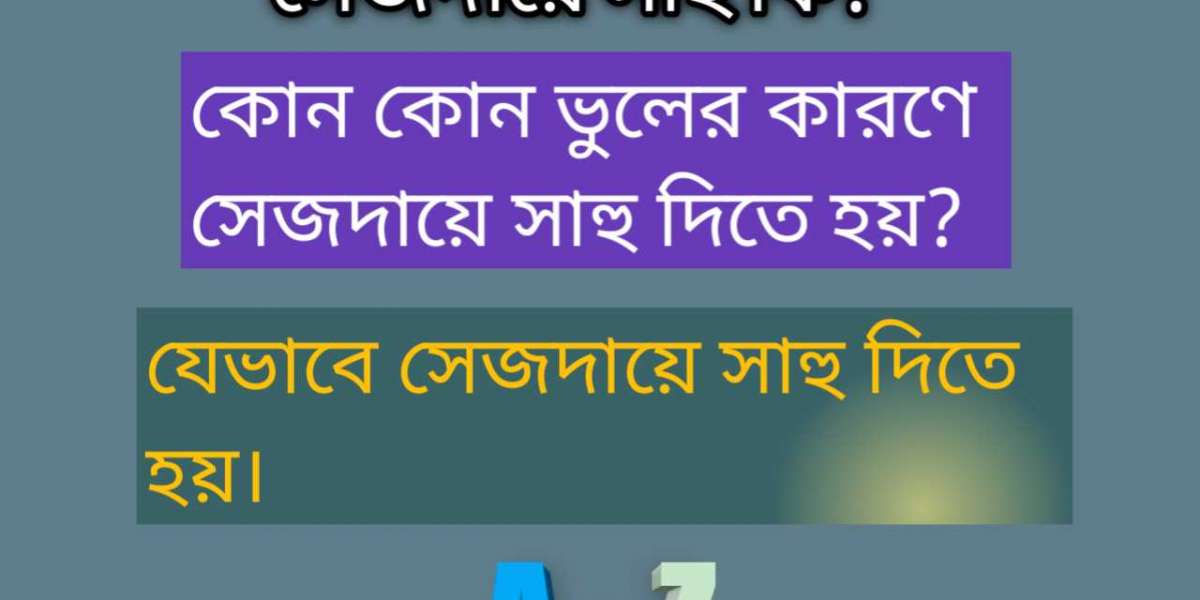নামাজ সঠিক হওয়ার জন্য নামাজের সমস্ত নিয়ম কানুন মেনে নামাজ আদায় করা জরুরি । আপনি যদি নামাজের মধ্যে থাকা ফরজ বা কোন ওয়াজিব ইচ্ছাকৃত অথবা ভুলে ছেড়ে দেন, তবে আপনার নামাজ আদায় হবে না । কিন্ত হ্যাঁ নামাজের মধ্যে থাকা ওয়াজিবগুলোর মধ্যে যদি কোন একটা ওয়াজিব ভুলে ছুটে যায়, তবে সেজদায়ে সাহু দিলে নামাজ আদায় হয়ে যাবে (নামাজের ওয়াজিবসমূহ নিয়ে আমি আলাদা ভাবে একটা পোস্ট তৈরি করবো ইনশা আল্লাহ) । কিন্ত এটা ফরজের ক্ষেত্রে প্রযোয্য নয়, নামাজের মধ্যে থাকা ফরজগুলোর মধ্যে যদি কোন একটা ফরজ ইচ্ছাকৃত বা ভুলে ছুটে গেলে নামাজ পুনরায় পড়তে হবে ।
➤ In order for the prayers to be correct, it is necessary to perform the prayers in accordance with all the rules and regulations of the prayers. If you omit the obligatory or any obligatory part of the prayers intentionally or by mistake, your prayers will not be performed. But yes, if one of the obligations in the prayers is forgotten, then the prayers will be performed if Sahu is given in the prostration (I will make a separate post about the obligations of the prayers, Insha Allah). However, this does not apply to the obligatory prayers.
সেজদায়ে সাহু সম্পর্কে আমরা বেশিরভাগ লোকই অবগত নই । নামাজের মধ্যে আমাদের সেজদায়ে সাহু ওয়াজিব হলে আমরা বুঝতেই পারি না যে, আমার নামাজে সেজদায়ে সাহু ওয়াজিব হয়েছে এবং না জানার কারণে এ অবস্থাতেই আমরা নামাজ শেষ করে দেই । কিন্ত আমার নামাজটা সঠিক হলো কি না তার দিকে আমরা খেয়ালই রাখি না ।
➤ Most of us are not aware of Sahu in prostration. If Sahu is obligatory in our prostration in the prayers, then we do not understand that Sahu is obligatory in my prostration in our prayers and because we do not know, we end the prayers in this condition. But we don't care if my prayer is correct or not.
তাই আজকের এই পর্বে আমি সেজদায়ে সাহু কি? কিভাবে সেজদায়ে সাহু দিতে হয়? কেন সেজদায়ে সাহু দিতে হয়? বিস্তারিত আলোচনা করার চেষ্টা করবো ।
➤ So in today's episode I prostrate sahu what? How to give sahu in prostration? Why give sahu in prostration? I will try to discuss in detail.
সাহু(سهو) শব্দের অর্থ হচ্ছে ভুল অর্থাৎ সেজদায়ে সাহু মানে হচ্ছে নামাজের মধ্যে হয়ে থাকা ভুলের পরিবর্তে যে সেজদা দেওয়া হয় ।
➤ The word sahu (سهو) means wrong, that is, sahu in prostration.
নামাযের মধ্যে কিছু কিছু ভুল রয়েছে যেগুলোর পরিবর্তে সেজদায়ে সাহু দেওয়ার দ্বারা নামাজ আদায় হয়ে যায় । কিন্ত যদি সেজাদায়ে সাহু ওয়াজিব হওয়া সত্বেও সেজদাহ না করে তাহলে তার নামাজ আদায় হবে না । পুনরায় তাকে নামাজ আদায় করতে হবে ।
➤ There are some mistakes in the prayers which are replaced by the sahu in prostration. But if Sahu does not prostrate in spite of being obligatory in prostration, then his prayers will not be performed. He has to pray again.
তবে সকল ভুলের কারণে সেজদায়ে সাহু দিলে হবে না । ধরুণ নামাজের মধ্যে কোন ব্যক্তির অজু চলে গেলে সেজদায়ে সাহু তার জন্য যথেষ্ট হবে না । ফরজ ছুটে গেলে সেজদায়ে সাহু দিলে নামাজ হবে না ।
➤ However, it is not necessary to give sahu in prostration due to all mistakes. If a person's aju goes away during dharuna prayers, sahu in prostration will not be enough for him. If the duty is missed, the prayers will not be performed if Sahu is given in prostration.
সেজদায়ে সাহু দেওয়ার নিয়ম / Rules for giving sahu in prostration
নামাজের শেষ বৈঠকে তাশাহুদ পড়ার পরে শুধুমাত্র ডান দিকে সালাম ফিরিয়ে অন্যান্য সেজদাহ এর মত দুই সেজদাহ করবে । উভয় সেজদাতে সেজদার তাসবিহ পড়বে এবং দুই সেজদার মাঝখানে এক তাসবীহ পরিমান সময় সোজা হয়ে বসতে হবে । তারপর সেজদাহ থেকে উঠে বসে পড়বে এবং পুনরায় তাশাহুদ, দরূদ শরীফ, দুআয়ে মাসূরাহ পড়ে উভয় দিকে সালাম ফিরিয়ে নামাজ শেষ করবে ।
➤ After reciting the tashahhud in the last sitting of the prayers, he will return the salutation only to the right and do two prostrations like the other prostrations. In both prostrations the prostration tasbeeh will be recited and in the middle of the two prostrations one tasbeeh amount of time will have to sit straight. Then he will get up from prostration and sit down and again recite Tashahhud, Darood Sharif, Dua Masurah and return the salutation to both sides and finish the prayers.
মাসআলালাঃ যদি কোন ব্যক্তি ভুলে ডান দিকে সালাম না ফিরিয়ে শুধুমাত্র তাশাহুদ পড়িয়া সেজদায়ে সাহু করে, তাহলেও নামাজ সঠিক হবে । আবার যদি কোন ব্যক্তি তাশাহুদ পড়ার পরে ভুলে দরূদ শরীফ, দো’আ পৃভৃতি পড়ে সেজদায়ে সাহু দেয়, তবেও তার নামাজ আদায় হয়ে যাবে ।
➤ If a person forgets and does not return the salutation to the right but only recites Tashahhud and prostrates in Sahu, then the prayers will be correct. Again, if a person forgets to recite Darood Sharif, Doa etc. after reciting Tashahhud and gives Sahu in prostration, his prayers will still be performed.
আরও পড়ুনঃ
ঈদের নামাযের নিয়ম-কিভাবে ঈদের নামাজ আদায় করবো
আজান দেওয়ার নিয়ম-আজান বাংলা উচ্চরণ সহ
দুনিয়া নিয়ে উক্তি দুনিয়া ত্যাগের উপায়
যে যে ভুলে সেজদায়ে সাহু ওয়াজিব হয় বা হয় না
- নামাজের মধ্যে যদি কোন রুকন আগে আদায় করে অথবা পরে আদায় করে অথবা কোন ওয়াজিব ভুল বশত ছেড়ে দেয় বা পরিবর্তন করে ফেলে, তাহলে সাহু সেজদা দেওয়া ওয়জিব হবে ।
➤ If a rukun is performed earlier or later in the prayers or a wajib is omitted or changed by mistake, then it will be wajib to perform sahu prostration.
- যদি নামাজের কোন ফরজ ভুলে ছুটে যায় বা কোন ওয়াজিব ইচ্ছাপূর্বক ছেড়ে দেয়, তবে সাহু সেজদা দিলে কোন লাভ হবে না, বরং নামাজ পুনরায় আদায় করতে হবে ।
➤ If one forgets any obligation of prayers or omits any wajib voluntarily, then there will be no benefit if Sahu prostrates, but the prayers will have to be performed again.
- ভুল বশত যদি কেউ দুই রুকু বা তিন সেজদা করে ফেলে, তাহলে সাহু সেজদা ওয়াজিব হবে ।
➤ If by mistake one does two ruku or three sajdah, then sahu sajdah will be obligatory.
- যদি কোন ব্যক্তি সূরা ফাতেহা না পড়ে অন্য সূরা পড়ে ফেলে বা সূরা ফতেহার আগে অন্য কোন সূরা মিলায় তারপর সূরা ফাতেহা পড়ে, তবে উক্ত সূরতেও সেজদায়ে সাহু ওয়াজিব হবে ।
➤ If a person recites another Surah without reciting Surah Fatiha or recites another Surah before Surah Fatiha and then recites Surah Fatiha, then Sahu will be obligatory in prostration in that Surat too.
- যদি ফরজ নামাজের প্রথম দুই রাকাতে সূরা ফতিহার সাথে অন্য সূরা মিলাতে ভুলে যায়, তবে শেষের দুই রাকাতে সূরা মিলিয়ে সেজদায়ে সাহু করলে নামাজ সঠিক হয়ে যাবে । যদি প্রথম দুই রাকাতের কোন এক রাকাতে সূরা মিলাতে ভুলে যায়, তবে তৃতীয় বা চতুর্থ রাকাতের কোন এক রাকতে সূরা মিলিয়ে নিবে এবং সাহু সেজদা করতে হবে । আবার যদি প্রথম দুই রাকাতে সূরা মিলাতে ভুলে যায় এবং শেষের দুই রাকাতেও সূরা মিলাতে ভুলে যায় এবং আত্তাহিয়্যাতু পড়ার সময় স্বরণ হয়, তবে আত্তাহিয়্যাতু পড়ে সাহু সেজদা করলে নামাজ সঠিক হয়ে যাবে ।
➤ If one forgets to combine Surah Al-Fatihah with another Surah in the first two rak'ahs of the obligatory prayers, then the prayers will be valid if one combines the Surahs in the last two rak'ahs in Sahu. If he forgets to recite the Surah in one of the first two rak'ahs, then he should recite the Surah in one of the third or fourth rak'ahs and Sahu must prostrate. If one forgets to recite Surah in the first two rak'ahs and forgets to recite Surah in the last two rak'ahs and recites while reciting Attahiyyatu, then if Sahu prostrates after reciting Attahiyyatu, the prayers will be correct.
- সুন্নত, নফল ও বিতরের নামাজে সকল রাকাতে সূরা মিলানো ওয়াজিব, যদি কেউ কোন রাকাতে ভুল বশত সূরা না মিলায়, তাহলে সাহু সেজদা কারা ওয়াজিব হবে ।
➤ It is obligatory to mix surahs in all rak'ahs of sunnat, nafl and witr prayers.
- তিন বা চারি রাকাত ফরজ নামাজের প্রথম বৈঠকে যদি কেউ তাশাহুদ দুইবার পড়ে ফেলে অথবা তাশাহুদ পড়ার পরে اللهم صل على محمد (আল্লহুম্মা ছাল্লে আলা মুহাম্মাদিন) পর্যন্ত বা তার থেকে বেশি দরূদ শরিফ পড়ে ফেলে, তাহলে সেজদায়ে সাহু ওয়াজিব হবে । কিন্ত যদি কেউ اللهم صل على (আল্লাহুম্মা ছল্লে আলা) পর্যন্ত বা তার চেয়ে কম উচ্চারণ করে এবং محمد (মুহাম্মাদ) শব্দ উচ্চারণ না করে, তবে সেজদায়ে সাহু ওয়াজিব হবে না ।
➤ If one recites the Tashahhud twice in the first sitting of the three or four rak'at obligatory prayers, or after reciting the Tashahhud until اللهم صل على محمد (Allahumma salle ala Muhammadin) or more, then Sahu will be obligatory in prostration. But if one utters up to or less than اللهم صل على (Allahumma challah ala) and does not utter the word محمد (Muhammad), then Sahu will not be obligatory in prostration.
- আত্তাহিয়্যাতু পড়তে বসিয়া যদি ভুলে অন্যকিছু পড়ে যেমনঃ ছানা, দো’আয়ে কুনূত বা সূরা ফতিহা, তাহলে উক্ত অবস্থায় সাহু সেজদা ওয়াজিব হবে ।
➤ If you forget to recite Attahiyyatu while reciting something else, such as Chana, Doaaye Qunoot or Surah Fatiha, then Sahu prostration will be obligatory.
- নামাজের নিয়্যাত বেঁধে যদি কেউ ভুলে ছানা পড়ার পরিবর্তে দো’আয়ে কুনূত বা তাশাহুদ পড়ে, তবে সাহু সেজদা ওয়াজিব হবে না । আবার যদি কেউ ফরজ নামাজের তৃতীয় বা চতুর্থ রাকাতে সূরা ফতিহার স্থলে তাশাহুদ, ছানা বা অন্য কিছু পড়ে, তাহলেও সাহু সেজদা ওয়াজিব হবে না ।
➤ If one recites Doaye Qunoot or Tashahhud in instead of reciting Chana, then Sahu Sajdah will not be obligatory. Again, if one recites Tashahhud, Chana or something else in place of Surah Fatihah in the third or fourth rak'at of the obligatory prayers, then Sahu prostration will not be obligatory.
- তিন বা চারি রাকাত নামাজের দ্বিতীয় রাকাতে বসা (যেটাকে প্রথম বৈঠক বলে) ওয়াজিব । কিন্ত যদি কেউ ভুলে না বসে তৃতীয় রাকাতের জন্য দাঁড়াইতে উদ্যত হয় এবং শরীরের নিম্নার্ধ সোজা হওয়ার পূর্বে বসে পড়ে, তবে সাহু সেজদা ওয়াজিব হবে না ; কিন্ত যদি শরীরের নিম্নার্ধ সোজা হয়ে যায়, তাহলে আর বসবে না, দাঁড়াইয়া তৃতীয় বা চতুর্থ রাকাত পুরা করবে এবং শেষ বৈঠকে সেজদায়ে সাহু করে নিবে । যদি সোজা হয়ে দাঁড়ানোর পরে বসে তাশাহুদ পড়ে, তাহলে নামাজ হবে না, পুনরায় আবার নামাজ আদায় করতে হবে ।
➤ Sitting in the second rak'ah of three or four rak'ah prayers (called the first sitting) is obligatory. But if one does not forget to stand for the third rak'ah and sits down before the lower half of the body is straightened, then Sahu prostration will not be obligatory; But if the lower half of the body becomes straight, then do not sit down, stand up and complete the third or fourth rak'ah and prostrate in the last sitting. If the tashahhud is recited while standing up straight, then the prayers will not be performed, the prayers will have to be performed again.
- যদি কোন ব্যক্তি চতুর্থ রাকাতের পর বসতে ভুলে গিয়ে দাঁড়াতে উদ্যত হয়, তখন যদি শরীরের নিম্নার্ধ সোজা হওয়ার পূর্বে স্বরণ হয়, তবে বসে পড়বে এবং আত্তাহিয়্যাতু, দরূদ ও দুআ পড়ে সালাম ফিরাবে, এ অবস্থায় সাহু সেজদা করতে হবে না । আর যদি সম্পূর্ণ সোজা হয়ে দাঁড়িয়ে যাওয়ার পর স্বরণ আসে, তবুও বসে আত্তাহিয়াতু পড়বে এবং সাহু সেজদা করবে ; এমনকি যদি সূরা ফতিহা বা রাকূ করার পরও স্বরণ আসে তবুও বসে পড়বে এবং আত্তাহিয়্যাতু পড়ে সাহু সেজদা করবে । কিন্ত যদি সেজদা করার পর স্বরণ হয়, তবে আর বসবে না, পঞ্চম রাকাত পূ্র্ণ করবে এবং আরও এক রাকাত পড়ে ছয় রাকাত পূর্ণ করে সালাম ফিরাবে, এই অবস্থায় ফরজ নামাজ পুনরায় পড়তে হবে, এই নামাজ নফল হয়ে যাবে, সাহু সেজদা করতে হবে । আর যদি ষষ্ঠ রাকাত না মিলায় পঞ্চম রাকাতের পর বসে সালাম ফিরায়, তাহলে এক রাকাত বাতিল ও চার রাকাত নফল হয়ে যাবে এবং ফরয পুনরায় পড়বে ।
➤ If a person forgets to sit and stand after the fourth rak'ah, then if the lower half of the body is straightened, then he will sit down and recite Attahiyyatu, Darood and Dua and return the salutation, in which case Sahu will not have to prostrate. And if the sound comes after standing completely straight, still sit and recite Attahiyatu and Sahu will prostrate; Even if the recitation comes after reciting Surah Fatiha or Raku, Sahu will sit down and prostrate after reciting Attahiyyatu. But if there is a recitation after prostration, then he will not sit down, he will complete the fifth rak'ah and after completing one more rak'ah he will return the salaam after completing six rak'ahs, in this case the obligatory prayers will have to be repeated And if the sixth rak'ah does not match and the salaam is returned after the fifth rak'ah, then one rak'ah will be canceled and four rak'ahs will become nafl and the fard will be repeated.
- যদি কোন ব্যক্তির নামাজের মধ্যে সন্দেহ হয় যে, চার রাকাত পড়েছে নাকি তিন রাকাত পড়েছে, তাহলে এ অবস্থায় দেখতে হবে যে, যদি কদাচিত এইরূপ সন্দেহ হয়, তবে একদিকে সালাম ফিরিয়ে ঐ নামাজ ছেড়ে দিয়ে নতুন ভাবে নিয়্যত করে নামাজ পুনরায় আদায় করবে । আর যদি প্রায়ই তার এইরূপ সন্দেহ হয়ে থাকে, তবে তাঁর চিন্তা করে দেখতে হবে যে, তাঁর মন কোন দিকে বেশি ঝুঁকে, যদি তিন রাকাতের দিকে ঝুঁকে, তাহলে তিন রকাত ধরিয়া আর এক রাকাত পড়ে নামাজ শেষ করবে, আর যদি চারের দিকে ঝুঁকে, তাহলে চার রাকাত ধরিয়া নামাজ শেষ করবে । এইরূপ সন্দেহের কারণে সাহু সেজদা ওয়াজিব হবে না । কিন্তু যদি চুপ করে বসে থেকে চিন্তা করে সময় অতিবাহিত করে, তবে সাহু সেজদা ওয়াজিব হবে । আর যদি উভয় দিকে সমান হয়, কোন দিকে মন না যায় এবং তিন নাকি চার কোনটাই স্থির করতে না পারে, তাহলে তিন রাকাত অর্থাৎ কমটাই ধরতে হবে, কিন্ত এই তৃতীয় রাকাতেও বসে আত্তাহিয়্যাতু পড়তে হবে । তৎপর চতুর্থ রাকাতেও বসে আত্তাহিয়্যাতু পড়তে হবে এবং সেজদায়ে সাহু করতে হবে ।
➤ If there is any doubt in the prayers of a person that four rak'ats have been recited or three rak'ats have been recited, then it should be seen that if there is such a suspicion, he should return the salutation on one side and repeat the prayers in a new manner. And if he often has such doubts, then he has to think about which way his mind is leaning more, if he leans towards three rak'ats, then he will hold three rak'ats and finish the prayer after one rak'at, and if he leans towards four, then four. He will finish the prayers with rak'at. Sahu prostration will not be obligatory due to such doubts. But if he spends time sitting quietly and thinking, then Sahu prostration will be obligatory. And if both sides are equal, the mind does not go in any direction and cannot decide which of the three or four, then it is necessary to hold three rak'ats, that is, less, but in this third rak'ah also one has to sit and recite Attahiyyatu. Then you have to sit in the fourth rak'ah and recite Attahiyyatu and do Sahu in prostration.
- এক নামাজের মধ্যে মাত্র একবার সাহু সেজদা করতে হয়, যদিও নামাজের মধ্যে অনেক ভুল করে না কেন । দুই বা ততোধিক ভুল হলেও একবার সেজদা করলেই হয়ে যাবে । এমনকি যদি সাহু সেজদা করার পরও কোন ভুল হয়, তবুও পুনর্বার সেজদা করতে হবে না ঐ সেজদাই যথেষ্ট হবে ।
➤ Sahu has to be prostrated only once in one prayer, even if one does not make many mistakes in the prayers. Even if you make two or more mistakes, you can do it only once. Even if there is any mistake after prostrating Sahu, there is no need to prostrate again - prostration will be enough.
- বিতরের নামাজে যদি দোআ-কুনূত পড়তে ভুলে যায় এবং শুধুমাত্র সূরা পড়িয়া রুকুতে চলে যায়, তবে রুকু থেকে আর ফিরে না এসে সেজদায়ে সাহু করে নিবে, কিন্ত যদি রুকু থেকে ফিরে এসে দোআ-কুনূত পড়ে তবে তার নামাজ বাতিল হয়ে যাবে ।
➤ If he forgets to recite Doa-Qunoot in the Witr prayers and goes to Ruku only after reciting Surah, he will not return from Ruku and prostrate in Sahu, but if he returns from Ruku and recites Doa-Qunoot, his prayers will be canceled.
- ভুলবশত নামাজের কোন ওয়াজিব তরক করিলে সেজদায়ে সাহু ওয়াজিব হয়, কিন্তু যদি কেউ ইচ্ছাকৃতভাবে ওয়াজিব তরক করে, তাহলে সেজদায়ে সাহু দিলেও নামাজ আদায় হবে না, বরং পুনরায় নামাজ আদায় করতে হবে । যদি কেউ ভুলবশত বা ইচ্ছাকৃতভাবে নামাজের কোন ফরজ ছেড়ে দেয়, তাহলেও সেজদায়ে সাহু দেওয়ার দ্বারা নামাজ আদায় হবে না, বরং পুনরায় নামাজ আদায় করতে হবে । নামাজের মধ্যে যদি কোন সুন্নত বা মুস্তাহাব তরক হয়ে যায়, তবে সেজদায়ে সাহু ওয়াজিব হয় না ।
➤ Sahu is obligatory in prostration if one makes a wajib argument of prayers by mistake, but if one deliberately argues wajib, then even if one gives sahu in prostration, the prayers will not be performed, but the prayers will have to be performed again. If one omits any of the obligatory prayers by mistake or intentionally, the prayers will not be performed by giving sahu in prostration, but will have to be performed again. If there is any sunnat or mustahab tarak in the prayers, then sahu is not obligatory in prostration.
- যেসব নামাজে চুপে চুপে কেরাআত পড়া ওয়জিব, যেমনঃ যোহর, আছর ও দিনের নফল এবং সুন্নত ; সেই সব নামাজে যদি কেউ ভুলে উচ্চস্বরে কেরাআত পড়ে, তবে সাহু সেজদা ওয়াজিব হবে । এইরূপে যে সব নামাজে ইমামের উচ্চস্বরে কেরাআত পড়া ওয়াজিব, যেমনঃ ফজর, এশা ও মাগরিব ; সেই সব নামাজে যদি ভুলে চুপে চুপে কোরাআত পড়ে, তাহলে সাহু সেজদা ওয়াজিব হবে ।
➤ It is obligatory to recite Qiraat silently in the prayers, such as: Zuhr, Asr and Nafl of the day and Sunnat; If one forgets to recite the Qur'an aloud in those prayers, then Sahu prostration will be obligatory. Thus it is obligatory to recite the Qur'an aloud in all the prayers, such as Fajr, Esha and Maghrib; If the Qur'an is recited silently in those prayers, then Sahu prostration will be obligatory.
মাসআলাঃ যদি নামাজের মধ্যে ইমাম সাহেব ভুল করে, তবে ইমাম মুক্বতাদি সকলের উপর সেজদায়ে সাহু ওয়াজিব হবে । কিন্তু মুক্বতাদি ভুল করার দ্বারা ইমাম ও মুক্বতাদি কারো উপর-ই সাহু সেজদা ওয়াজিব হবে না । মাসবুক্ব ব্যক্তি ইমামের ভুলের কারণে ইমামের সাথে সেজদায়ে সাহু দিতে হবে এবং তারপরে সে তার বাকি নামাজ আদায় করবে । মাসবুক্ব বলা হয় যে ব্যক্তি ইমামের সাথে নামাজের প্রথম রাকাত থেকে অংশগ্রহণ করতে পারে নাই ।
আশা করি পোস্টটি থেকে সেজদায়ে সাহু সম্পর্কে পূর্ণ ধারণা পেয়েছেন । কিন্তু যদি কারো মনে সেজদায়ে সাহু নিয়ে কোন প্রকার প্রশ্ন থেকে থাকে, তাহলে কমেন্ট বক্সে জানাতে পারেন । যথাসাধ্য উত্তর দেওয়ার চেষ্টা করবো ।
You can ask us for your necessary daily Masala-Masail by using our website www.https://theislamiccommunication.xyz



